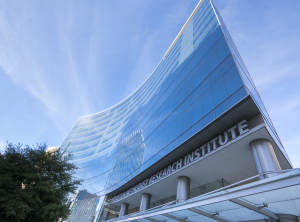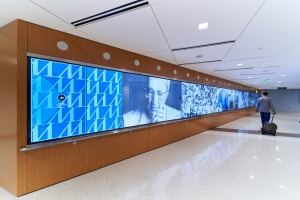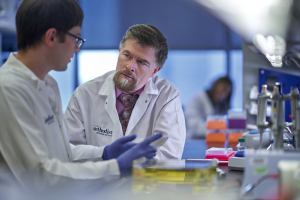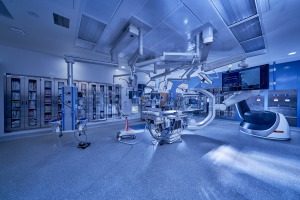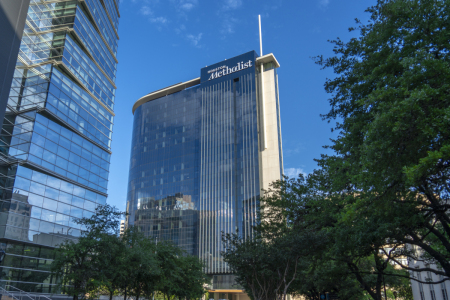Q & A with Dr. Marc Boom, president and CEO of Houston Methodist
May 31, 2019
by Sean Ruck, Contributing Editor
This year marks a big milestone for Houston Methodist. The hospital system is recognizing the 100th year since its founding. HealthCare Business News is doing its part to spread the celebration by speaking with Dr. Marc Boom, president and CEO of Houston Methodist, about the past, present and future of the organization.
HCB News: What attracted you to a career in healthcare?
Marc Boom: In high school, I made the decision to become a physician, and that’s what I pursued and where my career started. It was also in my genes to a certain extent. My mom, in a different era I think, would have been a physician. She was a schoolteacher early on, but has volunteered in hospitals as long as I can remember dating back to the 1980s. I think I had that interest in medicine through her. But like most people who enter the field I recognize what an amazing and rewarding career healthcare is. The ability to help people get through some of their toughest times, develop long-term relationships, it’s strongly appealing. I really consider having a career in healthcare a great privilege and even a calling.
HCB News: How long have you been with Houston Methodist?
MB: I will celebrate my 22nd year in about three weeks. I am in my 8th year as CEO.
HCB News: What is the work culture like at Houston Methodist?
MB: If you asked me what the absolute best thing about Houston Methodist is, it would be our culture. We are very intentional about our culture. We really believe that organizations need to be intentional about culture to grow and nurture it. For us, we call it I CARE, which stands for integrity, compassion, accountability, respect and excellence. It really permeates throughout our organization, from our board of directors on through the institution. You can walk up to any one of our 24,000 employees and our thousands of doctors, and if you were to ask what the culture is, what the values are, they would talk about I CARE. We believe the patient is at the center of everything that we do and that faith and spirituality, caring for the whole individual, are part of that health journey.
HCB News: What are your patient demographics like?
MB: We are a regional healthcare system, in that we serve the Greater Houston area. To put that into perspective, the Greater Houston area geographically — our geographic reach — is bigger than the state of New Jersey. So it’s a very large geographic area. Houston is the most diverse city in the country, which is one of its wonderful strengths. Our patient population really mirrors that.
HCB News: What is the makeup of payors?
MB: I think you’d see a very traditional makeup. Our number one payor, as with almost any adult care hospital in the country, is Medicare. Broadly, our number two payors would be all of the commercial insurers, all the large and many of the smaller insurers.
HCB News: Why do patients choose Houston Methodist?
MB: We talk about our vision for the second century. We’re 100 years old in 2019 — we can come back to that. But our simple vision is six words: Unparalleled safety, quality, service, and innovation. So really, we seek to be an independent academic medical center and community hospitals that are literally second-to-none. We start with safety because that is the most important thing when you talk about hospital care. But following that, the utmost quality of care in a spiritual environment that’s caring and serving. We’re also an institution that values innovation and is always pushing the envelope to define tomorrow’s healthcare and train tomorrow’s doctors.
I’d also point out that as patients do their research when choosing a hospital, we are consistently, year after year, ranked as the number one hospital in the state of Texas from U.S. News & World Report. We are very proud of that fact. With our philosophy of focusing on the fundamentals, accolades tend to follow.
There’s an organization called Vizient. Within it, there’s a consortium of all the large academic medical centers within the United States. We all share data based on a range of categories, and we consistently are in their top group. When Medicare asks patients the questions “would you recommend this hospital?” our hospital gets the best scores in the city.
HCB News: What is the biggest challenge your hospital faces?
MB: I think that providing healthcare is such a calling and a privilege, nothing’s hard. It’s more the challenge of how to take it to the next level. How do we get even better? How do we provide better care for our patients? We want to be sure we’re the best institution for our patients’ care. We attract patients from over 90 countries for care. From every state. Accommodating them and making sure they have a great experience is really what we’re all about.
I think all of healthcare, honestly, struggles with access and coordination. We’re working very hard using technology and innovation to tackle those specific issues that are key to transforming the patient experience.
HCB News: What’s the next big opportunity Houston Methodist is working on?
MB: This past year, we created a center for innovation. We feel like technology, not medical devices and medical technology (where we already have a great focus), but digital technology like apps and the internet are where we need greater focus. We really feel they’re at an inflection point in being able to transform the patient’s journey and care. How can we take that and coordinate access, care, facilitate care, make the experience of being a patient or potential patient better than it is today?
The second big area is what we’re affectionately calling “The Big Idea”. After about a century of advances in modern medicine that really focused on treating and in some cases eradicating disease, we’ve made tremendous progress. The next century is going to be about extending life span, extending health span. That’s really a major area of focus for our research enterprise, and what we call our clinical translations, which is where we determine how we take research to the patient rapidly.
HCB New: This year marks the hospital’s centennial. Do you have celebrations planned?
MB: We started in 1919 as a small hospital. Today, 24,000 employees strong, we have an academic flagship hospital, a research institute, medical education programs, physician organizations and community hospitals. It’s hard to imagine our founders even considering that 100 years ago. To celebrate, we have a host of things planned. We’re writing our institution’s history book, which every one of our employees will receive later this year. There’s a documentary that will be premiering in a couple of months. We’ve been honoring people we consider “game changers” during six luncheons throughout the year.
We also had a massive party with all of our employees this past weekend to honor and thank them, which we held at NRG stadium, home of the Houston Texans. Probably about half our employees came to that event, bringing family members and something like 36,000 people attended.
Last, but not least, we created a 53-foot interactive digital wall that went into our new tower, which tells the history of Houston Methodist.
HCB News: We won’t look to the next bicentennial for predictions, but how about a decade ahead? How do you think medicine and the profession of healthcare will have changed?
MB: I think we’re going to see technology enable much better healthcare than we have seen in the past. When it comes to digital technology, unfortunately, many clinicians have seen it as a hindrance, but I think we’re getting to the point that it’s improving efficiency. App-based healthcare, virtual care — these things will be very positive.
To give you some examples, we are the first hospital in Houston to offer 24-hour virtual care. Our clinicians are providing virtual care via an app. You can click a button to schedule an appointment. A clinician has a video visit with that individual. This happens on the patient’s schedule, when they want to be seen, without a wait time, without a drive. We did this very purposely. We piloted this with our employees. We opened it free of charge, literally conducted thousands of visits, worked out the wrinkles and then introduced it to the public We’ve been doing this for about 50 days so far.
The other piece — I do believe we are in the midst of a transformation in healthcare, with cures for chronic disease. For that, we’ll tap into brain computer interfaces, neural modulation, other regenerative techniques.
HCB News: Healthcare continues to get more expensive. There’s real concern it will be untenable in the years ahead if something’s not done to curb those cost increases. If you had the ability to take two or three actions to get things on the right track, what would they be?
MB: It’s an immensely complex problem. Access is one of the biggest issues. I think we’re on the right path with much of what we’re doing through technology and digital care that we can make a difference. Coordination and management of chronic disease is also an area that I think is ripe for transformation. I also believe, as I mentioned earlier with our Big Idea, that we are going to be able to shift more into health span versus life span. We’ll be able to focus much more into how we keep people healthy throughout their lives to let them lead rich and satisfying and rewarding lives where they’re able to avoid suffering, avoid chronic illness and interact with their loved ones.
HCB News: What attracted you to a career in healthcare?
Marc Boom: In high school, I made the decision to become a physician, and that’s what I pursued and where my career started. It was also in my genes to a certain extent. My mom, in a different era I think, would have been a physician. She was a schoolteacher early on, but has volunteered in hospitals as long as I can remember dating back to the 1980s. I think I had that interest in medicine through her. But like most people who enter the field I recognize what an amazing and rewarding career healthcare is. The ability to help people get through some of their toughest times, develop long-term relationships, it’s strongly appealing. I really consider having a career in healthcare a great privilege and even a calling.
Integrated into one of the nation’s finest hospitals,
the 440,000-square-foot Houston Methodist Research
Institute, provides the technology and support researchers
need to effectively and efficiently bring cures through all
stages of clinical trials and to patients around the world.
the 440,000-square-foot Houston Methodist Research
Institute, provides the technology and support researchers
need to effectively and efficiently bring cures through all
stages of clinical trials and to patients around the world.
MB: I will celebrate my 22nd year in about three weeks. I am in my 8th year as CEO.
HCB News: What is the work culture like at Houston Methodist?
MB: If you asked me what the absolute best thing about Houston Methodist is, it would be our culture. We are very intentional about our culture. We really believe that organizations need to be intentional about culture to grow and nurture it. For us, we call it I CARE, which stands for integrity, compassion, accountability, respect and excellence. It really permeates throughout our organization, from our board of directors on through the institution. You can walk up to any one of our 24,000 employees and our thousands of doctors, and if you were to ask what the culture is, what the values are, they would talk about I CARE. We believe the patient is at the center of everything that we do and that faith and spirituality, caring for the whole individual, are part of that health journey.
Houston Methodist Hospital sits in the heart of the Texas
Medical Center, one of the premiere medical centers
in the world. The hospital has been named the best
hospital in Texas by U.S. News & World Report for
seven years in a row.
Medical Center, one of the premiere medical centers
in the world. The hospital has been named the best
hospital in Texas by U.S. News & World Report for
seven years in a row.
MB: We are a regional healthcare system, in that we serve the Greater Houston area. To put that into perspective, the Greater Houston area geographically — our geographic reach — is bigger than the state of New Jersey. So it’s a very large geographic area. Houston is the most diverse city in the country, which is one of its wonderful strengths. Our patient population really mirrors that.
HCB News: What is the makeup of payors?
MB: I think you’d see a very traditional makeup. Our number one payor, as with almost any adult care hospital in the country, is Medicare. Broadly, our number two payors would be all of the commercial insurers, all the large and many of the smaller insurers.
Dr. Thomas MacGillivray, Houston Methodist’s chief of
cardiac surgery and thoracic transplant, performing surgery.
cardiac surgery and thoracic transplant, performing surgery.
MB: We talk about our vision for the second century. We’re 100 years old in 2019 — we can come back to that. But our simple vision is six words: Unparalleled safety, quality, service, and innovation. So really, we seek to be an independent academic medical center and community hospitals that are literally second-to-none. We start with safety because that is the most important thing when you talk about hospital care. But following that, the utmost quality of care in a spiritual environment that’s caring and serving. We’re also an institution that values innovation and is always pushing the envelope to define tomorrow’s healthcare and train tomorrow’s doctors.
I’d also point out that as patients do their research when choosing a hospital, we are consistently, year after year, ranked as the number one hospital in the state of Texas from U.S. News & World Report. We are very proud of that fact. With our philosophy of focusing on the fundamentals, accolades tend to follow.
There’s an organization called Vizient. Within it, there’s a consortium of all the large academic medical centers within the United States. We all share data based on a range of categories, and we consistently are in their top group. When Medicare asks patients the questions “would you recommend this hospital?” our hospital gets the best scores in the city.
The Houston Methodist Centennial Wall is an interactive,
54-footlong wall that showcases Houston Methodist’s
long history of serving the community.
54-footlong wall that showcases Houston Methodist’s
long history of serving the community.
MB: I think that providing healthcare is such a calling and a privilege, nothing’s hard. It’s more the challenge of how to take it to the next level. How do we get even better? How do we provide better care for our patients? We want to be sure we’re the best institution for our patients’ care. We attract patients from over 90 countries for care. From every state. Accommodating them and making sure they have a great experience is really what we’re all about.
I think all of healthcare, honestly, struggles with access and coordination. We’re working very hard using technology and innovation to tackle those specific issues that are key to transforming the patient experience.
HCB News: What’s the next big opportunity Houston Methodist is working on?
MB: This past year, we created a center for innovation. We feel like technology, not medical devices and medical technology (where we already have a great focus), but digital technology like apps and the internet are where we need greater focus. We really feel they’re at an inflection point in being able to transform the patient’s journey and care. How can we take that and coordinate access, care, facilitate care, make the experience of being a patient or potential patient better than it is today?
The second big area is what we’re affectionately calling “The Big Idea”. After about a century of advances in modern medicine that really focused on treating and in some cases eradicating disease, we’ve made tremendous progress. The next century is going to be about extending life span, extending health span. That’s really a major area of focus for our research enterprise, and what we call our clinical translations, which is where we determine how we take research to the patient rapidly.
HCB New: This year marks the hospital’s centennial. Do you have celebrations planned?
MB: We started in 1919 as a small hospital. Today, 24,000 employees strong, we have an academic flagship hospital, a research institute, medical education programs, physician organizations and community hospitals. It’s hard to imagine our founders even considering that 100 years ago. To celebrate, we have a host of things planned. We’re writing our institution’s history book, which every one of our employees will receive later this year. There’s a documentary that will be premiering in a couple of months. We’ve been honoring people we consider “game changers” during six luncheons throughout the year.
We also had a massive party with all of our employees this past weekend to honor and thank them, which we held at NRG stadium, home of the Houston Texans. Probably about half our employees came to that event, bringing family members and something like 36,000 people attended.
Dr. John Cooke, (right) chair of the Department of
Cardiovascular Sciences at the Houston Methodist Research
Institute, working in a Houston Methodist laboratory.
Cardiovascular Sciences at the Houston Methodist Research
Institute, working in a Houston Methodist laboratory.
HCB News: We won’t look to the next bicentennial for predictions, but how about a decade ahead? How do you think medicine and the profession of healthcare will have changed?
MB: I think we’re going to see technology enable much better healthcare than we have seen in the past. When it comes to digital technology, unfortunately, many clinicians have seen it as a hindrance, but I think we’re getting to the point that it’s improving efficiency. App-based healthcare, virtual care — these things will be very positive.
A hybrid operating room in Walter Tower
providing patients with minimally invasive treatments
such as image-guided heart and brain procedures.
providing patients with minimally invasive treatments
such as image-guided heart and brain procedures.
The other piece — I do believe we are in the midst of a transformation in healthcare, with cures for chronic disease. For that, we’ll tap into brain computer interfaces, neural modulation, other regenerative techniques.
HCB News: Healthcare continues to get more expensive. There’s real concern it will be untenable in the years ahead if something’s not done to curb those cost increases. If you had the ability to take two or three actions to get things on the right track, what would they be?
MB: It’s an immensely complex problem. Access is one of the biggest issues. I think we’re on the right path with much of what we’re doing through technology and digital care that we can make a difference. Coordination and management of chronic disease is also an area that I think is ripe for transformation. I also believe, as I mentioned earlier with our Big Idea, that we are going to be able to shift more into health span versus life span. We’ll be able to focus much more into how we keep people healthy throughout their lives to let them lead rich and satisfying and rewarding lives where they’re able to avoid suffering, avoid chronic illness and interact with their loved ones.
The 22-story, $700 million Walter Tower houses 366 patient beds including 138 intensive
care beds, 204 acute beds, state-of-the-art technology and a VIP floor with 24 beds.
care beds, 204 acute beds, state-of-the-art technology and a VIP floor with 24 beds.

